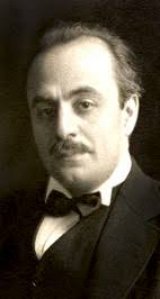On Houses
Kahlil Gibran 1883 (Bsharri, Mount Lebanon Mutasarrifate) – 1931 ( New York City)
Then a mason came forth and said, Speak to us of Houses.
And he answered and said:
Build of your imaginings a bower in the wilderness ere you build a house within the city walls.
For even as you have home-comings in your twilight, so has the wanderer in you, the ever distant and alone.
Your house is your larger body.
It grows in the sun and sleeps in the stillness of the night; and it is not dreamless. Does not your house dream? and dreaming, leave the city for a grove or hill-top?
Would that I could gather your houses into my hand, and like a sower scatter them in forest and meadow.
Would the valleys were your streets, and the green paths your alleys, that you might seek one another through vineyards, and come with the fragrance of the earth in your garments.
But these things are not yet to be.
In their fear your forefathers gathered you too near together. And that fear shall endure a little longer. A little longer shall your city walls separate your hearths from your fields.
And tell me, people of Orphalese, what have you in these houses? And what is it you guard with fastened doors?
Have you peace, the quiet urge that reveals your power?
Have you rememberances, the glimmering arches that span the summits of the mind?
Have you beauty, that leads the heart from things fashioned of wood and stone to the holy mountain?
Tell me, have you these in your houses?
Or have you only comfort, and the lust for comfort, that stealthy thing that enters the house a guest, and then becomes a host, and then a master?
Ay, and it becomes a tamer, and with hook and scourge makes puppets of your larger desires.
Though its hands are silken, its heart is of iron.
It lulls you to sleep only to stand by your bed and jeer at the dignity of the flesh.
It makes mock of your sound senses, and lays them in thistledown like fragile vessels.
Verily the lust for comfort murders the passion of the soul, and then walks grinning in the funeral.
But you, children of space, you restless in rest, you shall not be trapped nor tamed.
Your house shall be not an anchor but a mast.
It shall not be a glistening film that covers a wound, but an eyelid that guards the eye.
You shall not fold your wings that you may pass through doors, nor bend your heads that they strike not against a ceiling, nor fear to breathe lest walls should crack and fall down.
You shall not dwell in tombs made by the dead for the living.
And though of magnificence and splendour, your house shall not hold your secret nor shelter your longing.
For that which is boundless in you abides in the mansion of the sky, whose door is the morning mist, and whose windows are the songs and the silences of night.
Font size:
Submitted by halel on July 13, 2020
Modified on April 22, 2023
- 2:30 min read
- 536 Views
Quick analysis:
| Scheme | AXXXBX XXBX XCXXAC XXXXX XXXXDDX |
|---|---|
| Characters | 2,784 |
| Words | 500 |
| Stanzas | 5 |
| Stanza Lengths | 6, 4, 6, 5, 7 |
Translation
Find a translation for this poem in other languages:
Select another language:
- - Select -
- 简体中文 (Chinese - Simplified)
- 繁體中文 (Chinese - Traditional)
- Español (Spanish)
- Esperanto (Esperanto)
- 日本語 (Japanese)
- Português (Portuguese)
- Deutsch (German)
- العربية (Arabic)
- Français (French)
- Русский (Russian)
- ಕನ್ನಡ (Kannada)
- 한국어 (Korean)
- עברית (Hebrew)
- Gaeilge (Irish)
- Українська (Ukrainian)
- اردو (Urdu)
- Magyar (Hungarian)
- मानक हिन्दी (Hindi)
- Indonesia (Indonesian)
- Italiano (Italian)
- தமிழ் (Tamil)
- Türkçe (Turkish)
- తెలుగు (Telugu)
- ภาษาไทย (Thai)
- Tiếng Việt (Vietnamese)
- Čeština (Czech)
- Polski (Polish)
- Bahasa Indonesia (Indonesian)
- Românește (Romanian)
- Nederlands (Dutch)
- Ελληνικά (Greek)
- Latinum (Latin)
- Svenska (Swedish)
- Dansk (Danish)
- Suomi (Finnish)
- فارسی (Persian)
- ייִדיש (Yiddish)
- հայերեն (Armenian)
- Norsk (Norwegian)
- English (English)
Citation
Use the citation below to add this poem to your bibliography:
Style:MLAChicagoAPA
"On Houses" Poetry.com. STANDS4 LLC, 2024. Web. 25 Apr. 2024. <https://www.poetry.com/poem/54004/on-houses>.



Discuss the poem On Houses with the community...
Report Comment
We're doing our best to make sure our content is useful, accurate and safe.
If by any chance you spot an inappropriate comment while navigating through our website please use this form to let us know, and we'll take care of it shortly.
Attachment
You need to be logged in to favorite.
Log In